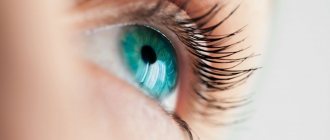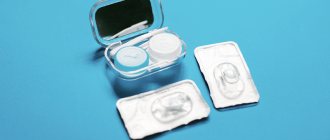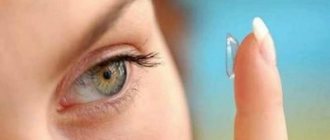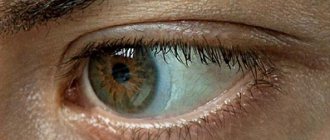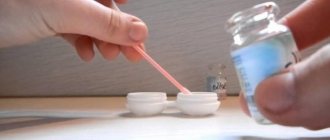HomeArticlesArticles about lensesContact lenses: what are they? What are contact lenses “without taking them off at night”?
Published:
Back to archive
Some contact lens wearers prefer to wear them continuously. The advantage of this method of wearing is that vision always remains clear, and there is no need to care for contact lenses and put them on and take them off every day. You just need to visit an ophthalmologist regularly for eye examinations.
Features of wearing contact lenses
Contact lenses provide comfortable correction of visual impairments. While glasses can rub the bridge of the nose, distort the image, scratch and fog up, contact lenses create a single optical system with the eyes. Lenses can restore vision and change eye color. The latest generation contact lenses do not interfere with the penetration of oxygen into the cornea and have an extended wearing schedule.
When choosing lenses, you should immediately think about whether you can sleep in them at night. People who have irregular work schedules or cannot always remove their lenses safely should consider special breathable lenses that can be worn and slept in for long periods of time.
Contact lenses vary in terms of service life. Depending on their properties, they can be used for a year, six months, a month, or several weeks. There are also daily lenses. Previously, it was allowed to wear contact lenses strictly for 8 hours during the day.
The eyes receive oxygen from the air through the outer corneal layer; less oxygen comes in during sleep. When the surface of the eye is blocked by a foreign body, including a contact lens, oxygen supply is reduced. If a person sleeps in contact lenses, a critical lack of oxygen develops.
Constant oxygen starvation can result in corneal edema and erosions. Erosive processes provoke various ophthalmological diseases, since bacteria can freely penetrate through wounds into the deep structures of the eye.
People neglect the rules of wearing contact lenses for various reasons: fatigue, laziness, carelessness, forgetfulness. Lifetime contact lenses have become a breakthrough in the field of contact correction.
When to use continuous wear contact lenses?
Contact lenses with continuous wearing mode can be used by any patient for contact vision correction after a preliminary examination by an ophthalmologist, if the eyes are healthy and tolerate this mode of lens use well.
In addition, contact lenses “without taking them off at night” are simply irreplaceable for long trips on a train or bus, flights, as well as under certain operating conditions. Continuous wear of contact lenses may be indicated for therapeutic purposes and as an eye band after corneal surgery.
Which contact lenses are suitable for continuous wear?
Continuous wear means that contact lenses can be worn without removal for up to 30 days, as recommended by your eye care professional. For this wearing mode, only lenses recommended by the manufacturer are suitable.
These are always soft
contact lenses made of silicone hydrogel material
, since no other contact lenses can provide sufficient oxygen access to the cornea for a long time.
Hydrogel contact lenses allow oxygen to reach the eyes only due to the large amount of water in their composition. But water evaporates over time, and at the same time the supply of oxygen decreases. Silicone has high oxygen permeability, but it is too hard. In order for contact lenses to have a high degree of oxygen permeability and at the same time be soft, flexible and comfortable, it was necessary to combine the advantages of silicone and hydrogels. As a result, thanks to the efforts of highly qualified chemists, an innovative two-phase material was created - silicone hydrogel.
In silicone hydrogel contact lenses, the silicone phase predominates, which allows oxygen to pass through to the eyes. This way, healthy corneal metabolism in contact lenses is maintained, even if the patient sleeps in them. And the hydrogel phase, which penetrates the silicone in the form of strands, allows the lens to move freely on the surface of the eye and provides high wearing comfort. Thus, silicone hydrogel contact lenses allow oxygen to pass through regardless of moisture content and guarantee the most comfortable and healthy lens use.
How to choose continuous wear contact lenses
Contact lenses “without removal for up to 30 days” must be selected by an ophthalmologist. For continuous wear lenses, it is important to ensure that your eye condition allows you to use the lenses in this manner.
Remember that continuous wear contact lenses require increased attention from your doctor and more frequent examinations by your ophthalmologist. The doctor should prescribe the regularity of repeat visits individually for the patient, taking into account the characteristics of vision, the condition of the cornea and eyelids, experience in using contact lenses, eye sensitivity and tendency to allergies.
Which lenses should you not sleep in?
Daytime contact lenses left on at night will not cause critical harm to the eyes, but regular neglect of the rules of use can lead to serious consequences. Conventional lenses are made of hydrogel material, which has low permeability. Even 15 minutes of sleep in such contact lenses causes swelling of the cornea.
By falling asleep in lenses, a person gradually worsens the condition of his eyes. Signs of irritation will appear more and more often, pain will appear and the quality of vision will decrease. These symptoms are associated with the quality of the lenses and increased eye strain, so people do not change their wearing regimen.
Sleeping in lenses that are not designed for this purpose can cause your eyes to reject the lenses and make you unable to wear them in the future. Any ophthalmologist will confirm that sleeping in hydrogel lenses is prohibited.
What lenses can't be worn without removing them?
In continuous mode, only “breathable” silicone hydrogel lenses are allowed to be worn. But hydrogel SCLs are designed exclusively for daytime wear , which is what manufacturers warn about. You can only walk in such SCLs during the day, for 4-12 hours at a time. Leaving them overnight is unacceptable.
By violating the wearing regime, you risk getting complications in the form of:
- corneal edema;
- keratitis;
- erosions and ulcers;
- corneal neovascularization;
- injections of conjunctival vessels;
- opacities (spots) of the cornea.
As you can see, continuous wearing of hydrogel lenses leads to serious consequences, including loss of vision. Therefore, never leave hydrogel SCLs on your eyes overnight. And under no circumstances wear them for several days in a row. Remember that this can be very harmful to your eyes.
What contact lenses can you sleep in?
It must be remembered that lenses whose advertising promises continuous use are not always safe. You should choose contact lenses together with your doctor.
About 10 years ago, new silicone hydrogel contact lenses appeared that can be worn continuously for a month. If there are no contraindications, you can sleep in such lenses. Silicone hydrogel contact lenses are the safest of this category. They are considered best for wearing during the day and safe for short-term sleep. However, after a night in silicone hydrogel lenses, it is recommended to take a break.
Unlike hydrogel lenses, silicone hydrogel lenses have good permeability properties, that is, they allow much more oxygen to pass through. Thanks to silicone, the lenses work like a pump, while the hydrogel components moisturize the eyes. The level of natural oxygen enrichment of the eye should reach 80 Dk/t units, and silicone hydrogels have 100-160 units. This indicator makes it possible to wear such lenses continuously and sleep in them.
The most popular models of silicone hydrogel contact lenses can be considered “Air Optix Night&Day” from Alcon Ciba Vision, “Biofinity” from Cooper Vision and “Pure Vision2” from Bauch&Lomb. Continuous wearing of these lenses does not affect the quality and acuity of vision, even after a busy day. They provide comfort when working in front of a monitor, as well as in poorly ventilated and poorly humidified areas.
Silicone hydrogel contact lenses can be worn without removing for a week or a month continuously. However, individual contraindications must be taken into account.
Silicone hydrogel lenses are recommended for daytime wear. The extended mode is best used in extreme cases. It must be remembered that it is always better to remove your lenses at night, even if it is not possible to thoroughly wash your hands, than to go to bed with such a barrier in front of your eyes.
I forgot to take off my contact lenses at night, my eyes are red, there is a veil in my vision: what should I do?
Anything can happen in life - I forgot, I spontaneously stayed at a party, but there was no container and solution at hand. By the way, regarding such emergency situations, make it a rule to have the necessary equipment at hand. Today there are even compact miniature powder compacts (they just look a lot like them), which contain the container itself and a small bottle of solution. This is true, take note.
What to do if you accidentally fall asleep in your lenses:
- The first and most important rule is not to panic. Nothing fatal happened and you will not lose your sight. Naturally, we are talking about one night, and not six months, as in the previous example. After all, fear and negative thoughts in the head often create fictitious symptoms. No, we are not saying that there will be no consequences. It’s just that sometimes, drawing scary pictures in our heads, we begin to look for frightening signs in ourselves.
- On a note! If you have a situation where there is no place to wash your hands, and you need to remove your lenses, then at least use wet wipes. But this is only in extreme cases.
IMPORTANT: Do not trust advertising or advice from friends. Yes, one remedy will do for some, but for you it may be helpless. Therefore, always consult an ophthalmologist. Moreover, if you wear lenses, then suitable drops should always be in a visible place. If you are often outside the home, then put a bottle in your cosmetic bag. Moreover, it does not take up much space and weighs no more than 100 g.
- If you are worried about your vision getting worse, it will usually improve after one night. But it won’t hurt to see an ophthalmologist (especially if your eye is swollen or conjunctivitis appears, for example). He will not only diagnose the eye, but also prescribe the correct treatment.
- Give your eyes a break from lenses at least a day (or better yet, a few). Yes, don't wear them at all. If you can't live without them, then switch to glasses.
- It often happens that the lenses are stuck to the cornea itself. In such a situation, do not try to remove them by force. This way you can damage your cornea. Apply drops to your eyes and try the procedure again.
You can't sleep in lenses
. Of course, everyone can have an individual reaction. After all, everything depends on the sensitivity and receptivity of our eyes. But you shouldn’t rely on random luck, and try to avoid such situations.
Some tips in extreme cases:
- For example, you stayed overnight outside the house. If you can do without lenses the next day, then take them off without hesitation. Place the lenses in cups of water. Just don't think about putting them on in the morning. After such an overnight stay, the lenses need to be “marinated” in the solution for several hours so that they are thoroughly cleaned.
- If you can’t even get home without lenses, then take them off as soon as possible, be sure to moisturize your eyes and give them a day to rest.
What contact lenses can you sleep in? There is an opinion that there are lenses in which you can even sleep. Let us immediately remind you that daily lenses do not touch this aspect in any way. And it’s true - not so long ago (relatively) lenses appeared in which you can sleep.
- Silicone - hydrogel lenses can be worn from 6 days to 30 (that is, a whole month).
- And all thanks to the fact that silicone allows the cornea to receive the necessary oxygen as much as possible. While the hydrogel promotes excellent hydration of the eye.
- By the way, for comparison, ordinary soft hydrogel lenses have a throughput of up to 80 Dk/t units, but silicone hydrogel lenses have almost doubled this value - 100-160 units.
- Of course, the manufacturing company plays a big role. And in this matter, price is directly related to quality. Therefore, do not skimp on your vision and eye health. By the way, the interval for wearing lenses also depends on the price.
- But! Doctors do not recommend overusing even this product. We repeat again, at night your eyes should rest. But if you plan to spend the night in your lenses, then at least remove them and rinse them with a solution. After which you can wear it at night.
- By the way, even after such wonderful lenses, you need to moisturize your eyes in the morning by dropping drops or the same solution for lenses. Moisten the eyeball and clean the lenses a little from dead skin deposits.
- At the first opportunity, remove even such lenses and let your eyes rest! If it is not possible to go without them for a long time, then at least abstain for 1 hour.
You should choose high-quality lenses.
If we talk about companies, the leading positions are occupied by:
- “Pure Vision” and “Pure Vision2” from Bauch&Lomb (by the way, the second version is even more improved)
- "Air Optix Night&Day" by Alcon Ciba Vision
- and from Cooper Vision “Biofinity” lenses
And I would also like to add a few words about colored lenses:
- It is strictly forbidden to sleep in them! They are more dense and allow oxygen to pass through much worse. Let us remind you once again that oxygen starvation is a direct path to the development of various eye infections.
- And colored lenses can be worn for no more than 8 hours . Some manufacturers allow the number 10. But this is the maximum value.
How long can you wear contact lenses?
Tolerance of contact lenses is an individual thing. Some patients can wear lenses for a day and not feel any discomfort, while others experience discomfort after just a few hours. Before purchasing permanent contact lenses, it is recommended to buy a sample and evaluate your sensations.
Hydrogel lenses can be worn for 10-12 hours, and silicone hydrogel lenses for 15-18 hours. In the absence of contraindications, high-quality contact lenses made of silicone hydrogel can be worn from 6 to 30 days. It must be remembered that sleeping at night can shorten the shelf life of contact lenses. This question should be clarified before purchasing.
If lenses wear out quickly, the scheduled replacement date will be delayed. It is recommended to buy a new pair before any unpleasant sensations (redness, pain, discomfort) occur. The period of planned replacement is determined by the lens material, since the rate of accumulation of proteins and elements of the tear film depends on its properties.
The timing of the planned replacement may vary for each patient. This is influenced by the composition of tears, ophthalmological and general diseases, medication, climate and even ecology. If you do not follow the rules for caring for your lenses, their lifespan will be significantly reduced. Only an ophthalmologist can tell whether it is safe for a particular patient to use and sleep in extended-wear lenses. Contraindications can only be identified during a comprehensive examination.
Why is continuous wearing of lenses dangerous?
The contact lens in the eye is washed by tear fluid, which contains water, salts, proteins, carbohydrates and fats. These components are deposited on the lens, gradually saturating its structure. The shape of the lens changes, irregularities cause discomfort and injure the cornea. With prolonged use of a contaminated lens, the risk of infectious complications greatly increases and the pores close, preventing the free penetration of oxygen.
Proteins and carbohydrates accumulated on the lens gradually change their structure. They become foreign and turn into antigens, provoking an allergic reaction and corresponding symptoms. To prevent complications, you need to regularly remove your lenses and clean them.
How to increase the shelf life of lenses
Daily lenses are considered the most convenient and safest. Long-term optical systems must be rinsed, stored and disinfected in a special lens solution.
The lens storage container should be regularly treated with boiled water. After removing the lenses, they are washed with the solution and left in the container overnight. By following these rules, you can reduce the discomfort after an unplanned sleep in lenses.
If you are prone to allergies, it is better to use peroxide solutions. They are used to fill contact lenses at night. This allows you to disinfect the surface and remove deposits that cause an allergic reaction.
For those who are not ready to take care of them regularly, it is better to choose glasses for this purpose. Even short-term sleep in unsuitable lenses can cause severe discomfort and inflammation of the eyes.
Sources used:
- Good vision without glasses or lenses. Latest recommendations / R. Roseilo. - M.: Ripol Classic, 2011.
- You don't need glasses anymore / E.D. Ruban. - M.: Eksmo, 2012.
- Methods for improving vision / Yulia Savelyeva. - M.: Ripol Classic, 2006.
- Kazan State Medical University

